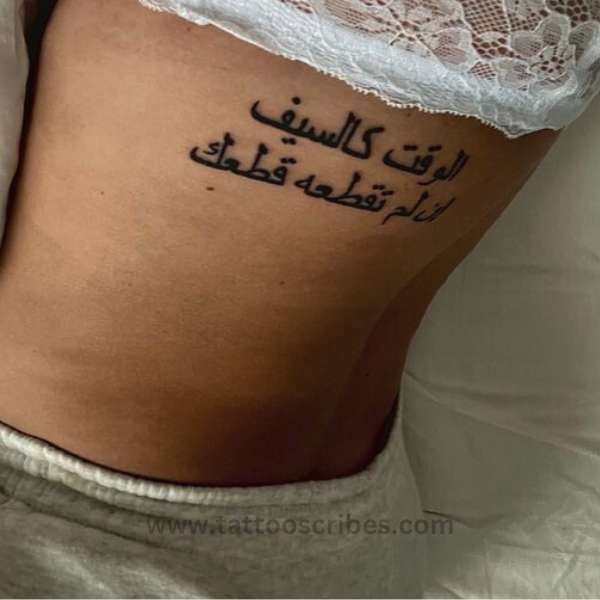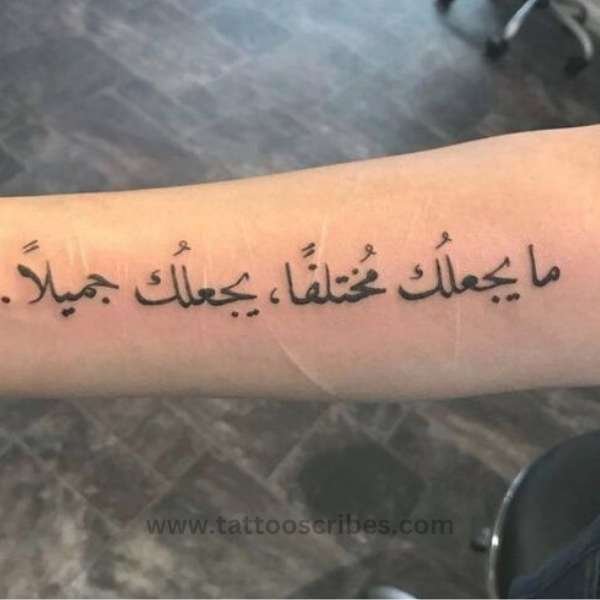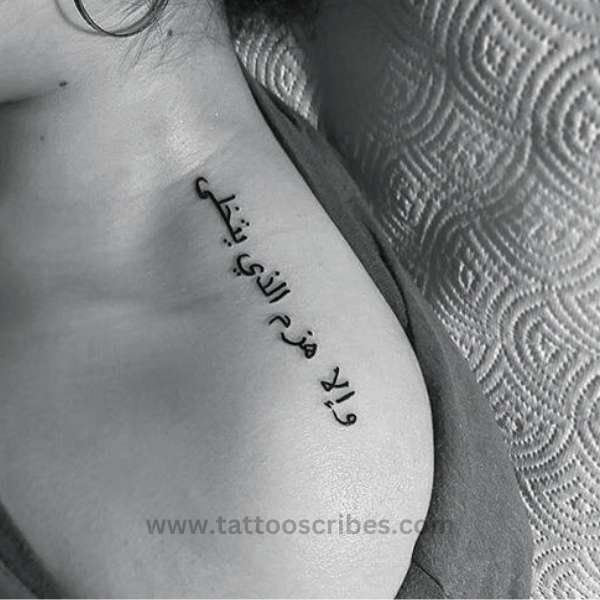Lina always wanted a meaningful tattoo that reflected her journey of rebirth. After visiting several tattoo shops, she choose an Arabic tattoo—a powerful symbol of strength and resilience.
Her tattoo artist explained the tattoo culture and symbolism behind each word, connecting it to the cycle of life.
Whether you are looking for the meanings or symbols of protection, understanding tattoo meanings can help you find the perfect design.

What Do Arabic Tattoos Mean?
An Arabic tattoo represents personal expression, spiritual beliefs, and cultural pride. Many designs convey powerful words, quotes, or names, reflecting inner values and life philosophy.
General Symbolism of Arabic Tattoos
- Faith – Often expresses religious or spiritual devotion.
- Strength – Represents resilience and personal courage.
- Identity – Highlights connection to heritage or personal beliefs.
- Love & Family – Commonly used for names or meaningful quotes.
- Wisdom – Arabic calligraphy conveys poetic or motivational messages.

Cultural Meanings of Arabic Tattoos
- Islamic Influence – Tattoos often reflect spiritual sayings, prayers, or proverbs.
- Artistic Tradition – Arabic calligraphy is valued as a form of high art.
- Cultural Pride – Shows respect and connection to Arabic heritage.
- Literary Legacy – Many tattoos reference famous poetry or proverbs.
- Personal Storytelling – Tattoos are used to narrate life experiences or values.
Arabic Tattoo Variations and Designs
- Calligraphy Tattoo – Elegant script for quotes, words, or names.
- Single Word Designs – Powerful messages like “love,” “hope,” or “faith.”
- Verse Tattoos – Short Quranic or poetic verses.
- Decorative Scripts – Flourishes, dots, or geometric designs enhance the style.

Color Variations of Arabic Tattoo
- Black – Classic, bold, and readable.
- Gold – Symbolizes richness and spiritual illumination.
- Colored Accents – Subtle reds or blues for artistic emphasis.
Other Symbolic Meanings of Arabic Tattoos
- Motivation – Inspires courage and determination in daily life.
- Love & Dedication – Honors family, friends, or life partners.
- Personal Growth – Marks milestones or important life changes.
- Connection – Links wearer to cultural or spiritual roots.
- Artistic Appreciation – Celebrates beauty and elegance of Arabic calligraphy.

Meaningful Placement Ideas
- Forearm – Visible expression of strength or personal motto.
- Back – Larger phrases or artistic quotes for impact.
- Wrist – Small words or symbols for private meaning.
- Neck or Collarbone – Subtle, intimate locations for personal quotes.
- Shoulder – Combines artistry with strength symbolism.
You may also like below posts:
Other Arabic Tattoo Variations

Arabic Tattoo Meaning
An Arabic tattoo meaning often reflects personal expression, spirituality, or cultural pride. Arabic script is loved for its flowing, artistic style, making it perfect for meaningful words, names, or quotes. This tattoo lets you carry a message that’s both beautiful and deeply personal, connecting language, art, and identity in a subtle, elegant way.
Arabic Tattoo Ideas With Meaning
Arabic tattoo ideas with meaning are perfect for expressing personal values, love, or inspiration in a beautiful, flowing script. Popular designs include words or phrases symbolizing strength, faith, and hope. With their elegant calligraphy, these tattoos offer a meaningful and stylish way to showcase what matters most to you.
Arabic Tattoo Designs With Meaning
Arabic tattoo designs with meaning celebrate art, culture, and personal expression. They often feature elegant calligraphy, symbols, or words that convey love, faith, strength, or wisdom. Each design is unique, letting you showcase a meaningful message or value in a stylish, culturally rich way that’s both beautiful and deeply personal.
Arabic Tattoo Quotes With Meaning
Arabic tattoo quotes with meaning are a stylish way to express deep thoughts, values, or personal mantras. Arabic script adds elegance and mystery, making each tattoo feel unique and meaningful. Whether it’s a quote about love, strength, or life’s journey, this tattoo lets you carry your message in a beautiful, timeless design.
Arabic Tattoo With Deep Meaning
An Arabic tattoo with deep meaning often carries messages of faith, love, or personal strength. The flowing script adds elegance, while the words chosen can reflect your values, life lessons, or a meaningful quote. It’s a beautiful way to express identity and emotions in a subtle, artistic style that’s uniquely personal.
Arabic Tattoo Name Translation With Meaning
An Arabic tattoo name translation with meaning lets you turn a name into elegant Arabic script while keeping its personal significance. These tattoos often symbolize identity, heritage, or a loved one, and choosing the right translation ensures it’s accurate, beautiful, and meaningful. It’s a stylish way to carry a name with pride.
Arabic Neck Tattoo Meaning
An Arabic neck tattoo meaning often reflects personal identity, culture, or a meaningful phrase in beautiful calligraphy. Placed on the neck, it’s bold yet elegant, making a statement about your beliefs, values, or life experiences. This tattoo combines artistry and symbolism, letting you wear words that inspire or define you.
Arabic 30 Tattoo Meaning
An Arabic 30 tattoo meaning often reflects personal significance, cultural pride, or a special milestone connected to the number 30. Using Arabic script adds an artistic, unique touch, making it stand out. This tattoo can symbolize growth, achievement, or a meaningful date, while showing your connection to Arabic culture in a stylish way.
Arabic Eye Tattoo Meaning
An Arabic eye tattoo meaning is all about protection, intuition, and warding off negative energy. Inspired by traditional symbols like the “evil eye,” it’s believed to keep you safe and aware of hidden dangers. Placing it on your body adds a personal touch while showing strength, insight, and spiritual awareness.
Arabic Hand Tattoo Meaning
An Arabic hand tattoo meaning is deeply personal, often symbolizing protection, strength, and cultural pride. Arabic calligraphy or symbols on the hand can express faith, heritage, or important life messages. This placement makes the tattoo visible and bold, letting you carry a meaningful story wherever you go.
Arabic Word Tattoo Meaning
An Arabic word tattoo meaning depends on the word you choose, as each carries its own story. Arabic tattoos often symbolize faith, love, strength, or wisdom, and the flowing script adds an artistic, elegant touch. It’s a beautiful way to express personal beliefs or emotions in a meaningful and stylish design.
Arabic Back Tattoo Meaning
An Arabic back tattoo meaning often reflects personal identity, culture, or meaningful words and phrases. Arabic script is elegant and flowing, making it a popular choice for tattoos that carry deep messages like love, faith, or inspiration. Placed on the back, it’s bold yet personal, letting your story shine in a beautiful way.
Arabic Sword Tattoo Meaning
An Arabic sword tattoo meaning symbolizes strength, courage, and honor. In Arab culture, swords represent protection, bravery, and a warrior spirit. Choosing this tattoo shows respect for heritage and a commitment to standing strong in life. Its bold design often reflects personal power and determination in a stylish, meaningful way.
Arabic Writing Tattoo Meaning
An Arabic writing tattoo meaning often reflects personal values, faith, or meaningful words in a beautifully artistic script. People choose it to express love, strength, or inspiration in a unique and elegant way. Its flowing calligraphy adds a stylish, personal touch, making the tattoo both visually striking and deeply meaningful.
Arabic Henna Tattoo Meaning
An Arabic henna tattoo meaning celebrates tradition, beauty, and personal expression. Known for its flowing, intricate patterns, Arabic henna designs often symbolize joy, protection, and celebration. Placed anywhere on the body, these tattoos bring a touch of elegance and cultural richness, making them a meaningful way to express creativity and individuality.
Arabic Letter Tattoo Meaning
An Arabic letter tattoo meaning often reflects personal identity, culture, or a meaningful word or name. Each letter can carry deep significance, like love, strength, or faith, and choosing the script adds an elegant, artistic touch. It’s a subtle yet powerful way to express something truly personal and meaningful on your body.
People Also Ask
Are Arabic tattoos religious?
They can be, often reflecting faith, prayers, or spiritual quotes.
Can I get an Arabic tattoo of my name?
Yes, names in Arabic calligraphy are common and meaningful.
Are Arabic tattoos hard to read?
Correct spelling and script style are crucial; always verify with a native speaker.
Do Arabic tattoos offend culture or religion?
It depends on context; respect and accuracy help avoid issues.
What colors work best for Arabic tattoos?
Black is classic; gold and subtle accents highlight elegance and style.
Can Arabic tattoos be customized artistically?
Yes, calligraphy allows flourishes, geometric accents, and creative layouts.
Wrap-up
Arabic tattoos are a stunning way to showcase personal meaning, from names to spiritual verses. When chosen thoughtfully, they hold deep significance and beauty.
Just remember to approach this art form with respect for its cultural roots and seek a skilled artist. We’d love to hear your thoughts—share them in the comments below! ✨
